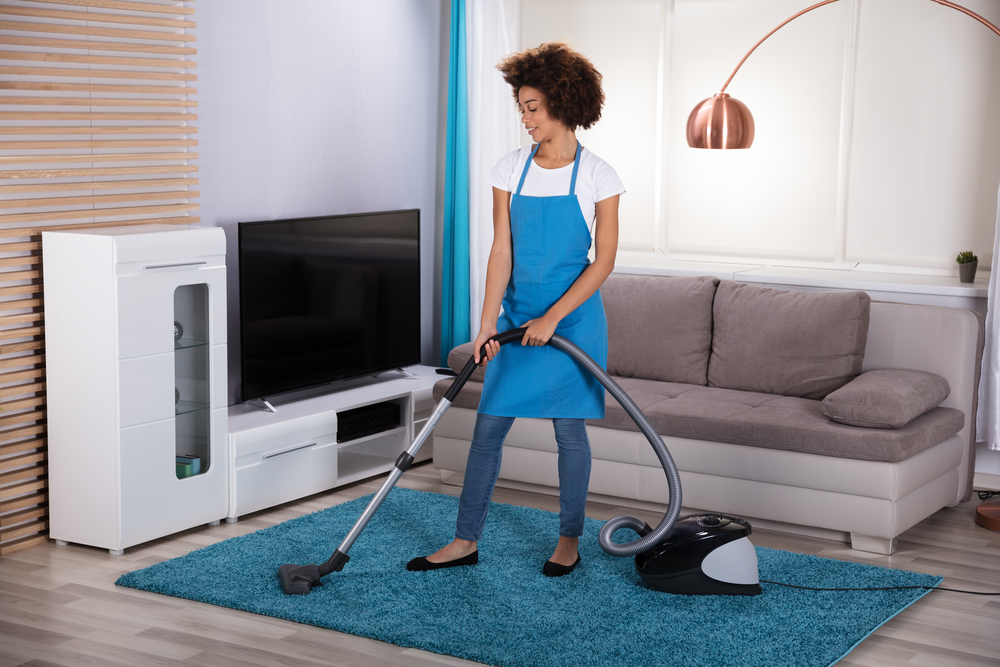Imagine this scenario: your cleaner is scheduled to come to your home tomorrow to tidy up and make everything sparkle. You’ve been looking forward to this moment for days, but now a nagging thought enters your mind – should you clean up before the cleaner arrives? It seems counterintuitive, right? After all, the whole point of hiring a cleaner is to avoid the hassle and stress of tidying up yourself. In this article, we’ll explore the common dilemma faced by many and delve into the reasons why some people feel the need to clean before the cleaner even arrives. Buckle up, and get ready to uncover the secrets behind this intriguing issue.
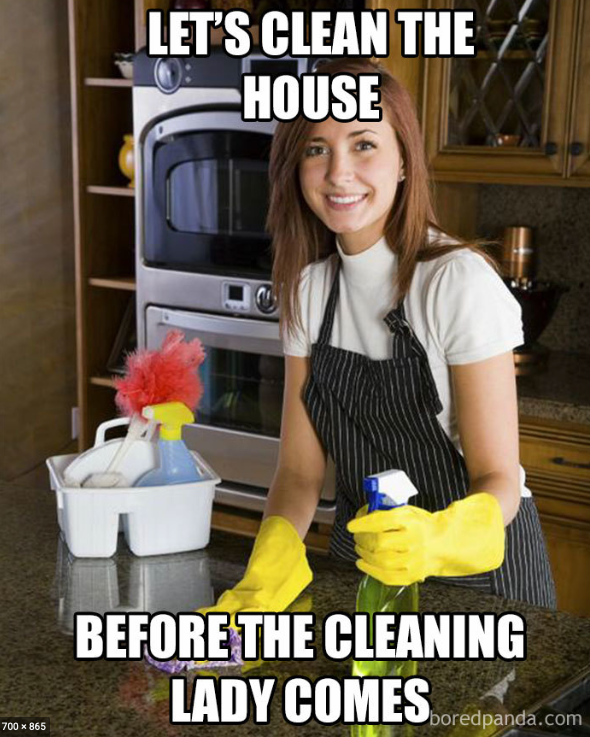
This image is property of static.wixstatic.com.
Reasons for Cleaning Before the Cleaner
Cleaning before the cleaner may seem counterintuitive at first, but it actually has several benefits. By taking the time to clean before the cleaner arrives, you can maintain cleanliness standards, save time and money, avoid potential judgment or embarrassment, ensure thorough cleaning, and prevent damage to personal items.
Maintaining cleanliness standards
Cleaning before the cleaner allows you to maintain the cleanliness standards you desire in your home. While a cleaner can certainly help maintain a clean environment, they may not have the same attention to detail or standards that you do. By cleaning before their arrival, you can ensure that your home is already in good condition and the cleaner can focus on the deeper cleaning tasks.
Saving time and money
When you clean before the cleaner, you can save both time and money. If you leave too much clutter or mess for the cleaner to handle, they may take longer to clean your home, resulting in higher hourly rates. Additionally, if the cleaner has to spend extra time picking up after you, they will have less time to devote to the actual cleaning tasks. By tidying up before their arrival, you can make their job easier and save time and money in the process.
Avoiding potential judgment or embarrassment
Let’s face it, having a cleaner come into your home can sometimes make you feel a bit self-conscious. You may worry about what they will think of your cleaning habits or the state of your home. By cleaning before their arrival, you can avoid potential judgment or embarrassment. When your home is already clean and tidy, you can feel more confident and relaxed when the cleaner is there.
Ensuring thorough cleaning
Another reason to clean before the cleaner is to ensure thorough cleaning. If your home is cluttered or messy, the cleaner may not be able to reach all areas or clean as thoroughly as they would like. By decluttering and tidying up, you give the cleaner easy access to all areas of your home and ensure that they can clean it thoroughly. This results in a cleaner and healthier living environment for you and your family.
Preventing damage to personal items
Lastly, cleaning before the cleaner can help prevent damage to your personal items. While most cleaners are careful and professional, accidents can happen. By removing fragile or valuable objects from the cleaning areas, you reduce the risk of them getting damaged during the cleaning process. Additionally, by securing personal items and valuables, you can have peace of mind knowing that your belongings are safe.
Areas to Clean Before the Cleaner Arrives
Now that you understand the reasons for cleaning before the cleaner, let’s explore the areas that you should focus on cleaning before their arrival. This will help you make the most of the cleaner’s time and ensure that all important areas are addressed.
General cleaning
Before the cleaner arrives, it’s important to tackle some general cleaning tasks. This may include dusting surfaces, wiping down countertops, cleaning mirrors, and vacuuming or sweeping the floors. By taking care of these basic cleaning tasks, you can create a clean and tidy foundation for the cleaner to build upon.
Clutter removal
One of the most important tasks to tackle before the cleaner arrives is clutter removal. Clearing away clutter not only makes your home look neater, but it also allows the cleaner to easily access all areas and surfaces that need to be cleaned. Take the time to organize and declutter your spaces, putting away items and getting rid of any unnecessary clutter.
Surface cleaning
Ensure that surfaces are clean and ready for the cleaner to hit the ground running. Wipe down countertops, tables, and other surfaces to remove any dust or dirt. This will help the cleaner focus on deeper cleaning tasks and ensure that the surfaces in your home are spotless.
Floor preparation
Prepare the floors for cleaning by removing any loose items, such as toys or shoes. This allows the cleaner to focus on deep cleaning the floors without the need to stop and pick up items. Additionally, if you have carpets, consider vacuuming them before the cleaner arrives to remove any loose dirt or debris.
Kitchen and dining areas
Focus on cleaning key areas in your kitchen and dining spaces. Make sure the sink is empty and clean, wipe down the stovetop, and clean any visible stains or spills on the countertops. In the dining areas, clear and wipe down the table, ensuring it is ready for the cleaner to work on.
Bathroom and toilet
Pay special attention to the bathroom and toilet areas. Clean the toilet bowl, wipe down the sink and countertops, and ensure that the shower or bathtub is clear of any personal items or products. By doing this, the cleaner can focus on deep cleaning these areas rather than spending time organizing or removing items.
Bedrooms and living spaces
Tidy up bedrooms and living spaces by making the beds, putting away any clothing or personal items, and removing any clutter from surfaces or floors. This allows the cleaner to focus on dusting, vacuuming, or any other necessary cleaning tasks in these areas.
Personal items and valuables
Before the cleaner arrives, securely store any personal items or valuables that you are concerned about. This could include jewelry, important documents, or sentimental items. By taking the time to secure these items, you can prevent any accidental damage or loss during the cleaning process.
Highly frequented areas
Consider focusing on highly frequented areas in your home, such as entryways or hallways. These areas often accumulate dirt, dust, and clutter, and can benefit from a quick clean before the cleaner arrives. This ensures that these high-traffic areas receive the attention they need.
Special requests or specific instructions
If you have any special requests or specific cleaning instructions for the cleaner, make sure you communicate them in advance. This could include areas of your home that require extra attention or certain cleaning products or methods that you prefer. By addressing these requests beforehand, you help the cleaner understand your expectations and ensure that they can provide a tailored cleaning service.
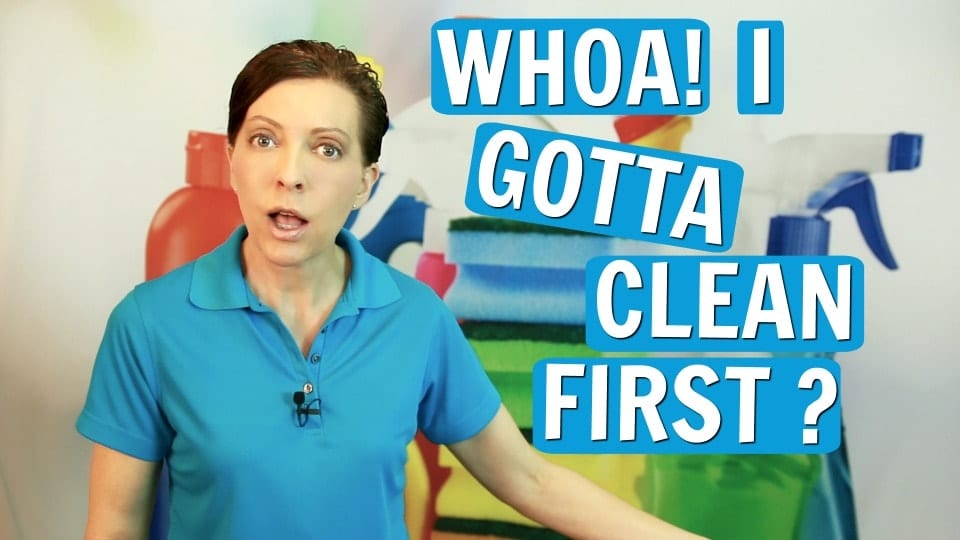
This image is property of askahousecleaner.com.
Cleaning Tips Before the Cleaner Arrives
Cleaning before the cleaner arrives is not just about tackling specific areas in your home. It’s also about being prepared and organized to maximize the efficiency and effectiveness of the cleaning service. Here are some helpful cleaning tips to follow before the cleaner arrives.
Create a cleaning checklist
Before the cleaner’s visit, create a cleaning checklist of tasks you would like them to focus on, as well as any specific instructions or requests you have. This checklist will help you stay organized and ensure that nothing is overlooked during the cleaning process.
Organize and declutter
Take the time to organize and declutter your home before the cleaner arrives. This not only makes their job easier but also allows them to focus on deep cleaning rather than tidying up. Put away items, clear surfaces, and create a clutter-free environment.
Pre-sort laundry and dry cleaning
If you have laundry or dry cleaning that needs to be taken care of, pre-sort it and have it ready for the cleaner to handle. This ensures that they can prioritize the cleaning tasks instead of spending unnecessary time sorting through laundry.
Secure personal items
Before the cleaner arrives, secure any personal items that you would prefer them not to handle or clean. This could include items of sentimental value, delicate objects, or personal documents. Place these items in a designated area or lock them away to ensure they remain undisturbed.
Remove fragile or valuable objects
Similarly, remove any fragile or valuable objects from the cleaning areas. This prevents the risk of them getting damaged during the cleaning process. Find a safe place to store these items until the cleaning is complete.
Identify and communicate specific cleaning needs
If there are specific areas or items in your home that require special attention or have unique cleaning requirements, make sure you communicate this to the cleaner. For example, if you have antique furniture that needs delicate handling or if you prefer certain cleaning products to be used, let the cleaner know in advance.
Prepare special cleaning products or equipment
If you have any special cleaning products or equipment that you would like the cleaner to use, make sure they are easily accessible. This saves time and ensures that the cleaner has all the necessary tools to address your specific cleaning needs.
Clear access to all areas
Before the cleaner arrives, ensure that there is clear access to all areas of your home that need to be cleaned. Remove any obstacles or barriers that may hinder their progress or prevent them from reaching certain areas.
Notify about potential hazards or issues
If there are any potential hazards or issues in your home that the cleaner should be aware of, such as loose floorboards or areas that require extra caution, be sure to notify them in advance. This helps prevent accidents and ensures the safety of both you and the cleaner.
Establish a regular cleaning routine
To maintain cleanliness in your home, establish a regular cleaning routine that complements the services provided by the cleaner. This routine could include tasks such as daily surface cleaning, weekly vacuuming, or monthly deep cleaning. By maintaining a regular cleaning routine, you can reduce the workload for the cleaner and keep your home in great condition between their visits.
Benefits of Preparing for the Cleaner
Preparing for the cleaner by cleaning before their arrival comes with several benefits. These benefits not only enhance the cleaning service itself but also contribute to a healthier and more enjoyable living environment.
Maximizes the cleaning service’s efficiency
By cleaning before the cleaner arrives, you maximize the efficiency of their service. When your home is already clean and tidy, the cleaner can focus on deep cleaning and tackling specific tasks, rather than spending time on general tidying up. This allows them to complete the cleaning more efficiently and potentially frees up additional time for other tasks.
Enhances the quality and results of the cleaning
Cleaning before the cleaner ensures that they can provide a more thorough and detailed cleaning service. When they don’t have to spend time on basic cleaning tasks or clutter removal, they can devote more attention to deep cleaning and achieving the best possible results. This enhances the overall quality of the cleaning and ensures that your home is sparkling clean.
Reduces the risk of accidents or damage
By cleaning before the cleaner’s arrival, you reduce the risk of accidents or damage to your personal items. When your home is already clean and organized, the cleaner can navigate through the space with ease and less risk of knocking over or damaging objects. This provides peace of mind knowing that your belongings are safe and secure.
Promotes a healthier and safer living environment
A clean home contributes to a healthier and safer living environment. By cleaning before the cleaner comes, you remove dust, allergens, and potential sources of bacteria. This helps improve indoor air quality, reduce the risk of respiratory issues, and create a healthier environment for you and your family.
Encourages a positive and professional relationship
Taking the time to clean before the cleaner arrives shows respect for their work and helps foster a positive and professional relationship. When you make their job easier, they are more likely to take pride in their work and provide excellent service. This positive relationship can lead to a long-lasting and satisfying cleaning experience.
Allows for more personalized cleaning
Cleaning before the cleaner allows them to focus on your specific cleaning needs and preferences. When your home is already clean and organized, they can allocate more time and attention to addressing your specific concerns or requests. This ensures that you receive a more personalized cleaning service that meets your expectations.
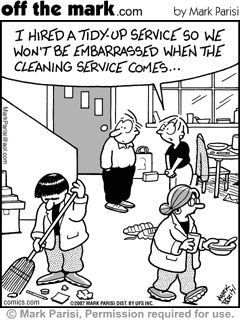
This image is property of i.pinimg.com.
Common Mistakes to Avoid
While cleaning before the cleaner’s arrival is important, it’s also essential to be mindful of some common mistakes to avoid. By avoiding these mistakes, you can ensure a smoother and more efficient cleaning experience.
Trying to do all the cleaning alone
One common mistake is attempting to do all the cleaning alone, without the help of a professional cleaner. While it’s great to maintain cleanliness in your home, hiring a cleaner allows you to delegate the more time-consuming and specialized cleaning tasks. By trying to do it all alone, you may end up feeling overwhelmed and sacrificing valuable time that could be better spent on other activities.
Withholding information or special requests
To have a successful cleaning experience, it’s important to communicate any special requests or instructions to the cleaner. Withholding this information can lead to misunderstandings or disappointment when the cleaner doesn’t fulfill your expectations. Be open and upfront about your cleaning needs and preferences to ensure a satisfactory outcome.
Neglecting specific cleaning instructions
If the cleaner provides you with specific cleaning instructions or guidelines, it’s important to follow them. Neglecting these instructions can result in subpar cleaning or even potential damage to your home or belongings. Take the time to read and understand any guidelines provided by the cleaner and adhere to them accordingly.
Failing to communicate access limitations
If there are any access limitations in your home, such as locked rooms or restricted areas, it’s crucial to communicate this to the cleaner. Failing to do so may result in wasted time or frustration for the cleaner. By providing clear instructions on which areas are off-limits, you can ensure a more streamlined and effective cleaning process.
Overloading the cleaner with too many tasks
While it’s tempting to maximize the cleaner’s time and tackle all cleaning tasks at once, overloading them with too many tasks can be counterproductive. A cleaner needs sufficient time and focus to perform their duties effectively. Trying to squeeze in too many tasks can lead to rushed or incomplete cleaning. Prioritize the most important tasks and discuss with the cleaner what can be realistically accomplished during their visit.
Forgetting to secure valuable or delicate items
One common mistake is forgetting to secure valuable or delicate items before the cleaner arrives. Accidents can happen, and it’s important to protect your belongings. Take the time to secure any valuable or delicate items in a safe place, ensuring they are not at risk of damage during the cleaning process.
Assuming the cleaner will handle everything
While a cleaner provides a valuable service, it’s important to remember that they have limitations. It’s unrealistic to expect them to handle every cleaning task or project in your home. Assess your specific needs and determine which tasks you can handle on your own or with the help of other professionals. Communicate your expectations and work collaboratively with the cleaner to ensure a successful outcome.
Tips for Effective Communication
Effective communication with your cleaner is key to a successful cleaning experience. By following these tips, you can establish clear expectations, address concerns promptly, and maintain a positive and productive relationship.
Establish clear expectations and boundaries
From the beginning, establish clear expectations and boundaries with your cleaner. Clearly communicate the frequency of visits, the scope of work, and any specific preferences or areas that require special attention. This ensures that both parties are on the same page and working towards a common goal.
Communicate preferences and standards
Let your cleaner know about your preferences and the cleanliness standards you expect. This could include how you prefer certain tasks to be done or specific cleaning products you would like them to use. By communicating your preferences, you help the cleaner deliver a service that aligns with your expectations.
Provide constructive feedback
If there are areas for improvement or specific feedback you want to share with the cleaner, provide it in a constructive manner. Avoid being overly critical or negative, and instead focus on highlighting what could be done differently or better. Constructive feedback allows the cleaner to understand your needs and adjust their approach accordingly.
Address concerns or issues promptly
If you have any concerns or issues with the cleaning service, address them promptly with the cleaner. Delaying or ignoring problems only exacerbates the situation and can lead to a breakdown in communication. By addressing concerns or issues as they arise, you give the cleaner an opportunity to resolve them and improve their service.
Express gratitude and appreciation
A little appreciation goes a long way. Take the time to express gratitude and appreciation for the cleaner’s work. A simple thank you or small gesture of gratitude can help foster a positive and respectful relationship, motivating the cleaner to continue delivering excellent service.
Maintain open and respectful communication
Throughout your interactions with the cleaner, maintain open and respectful communication. Listen actively, respond thoughtfully, and be receptive to their input or suggestions. A collaborative and respectful approach to communication sets the foundation for a successful and long-lasting cleaning arrangement.
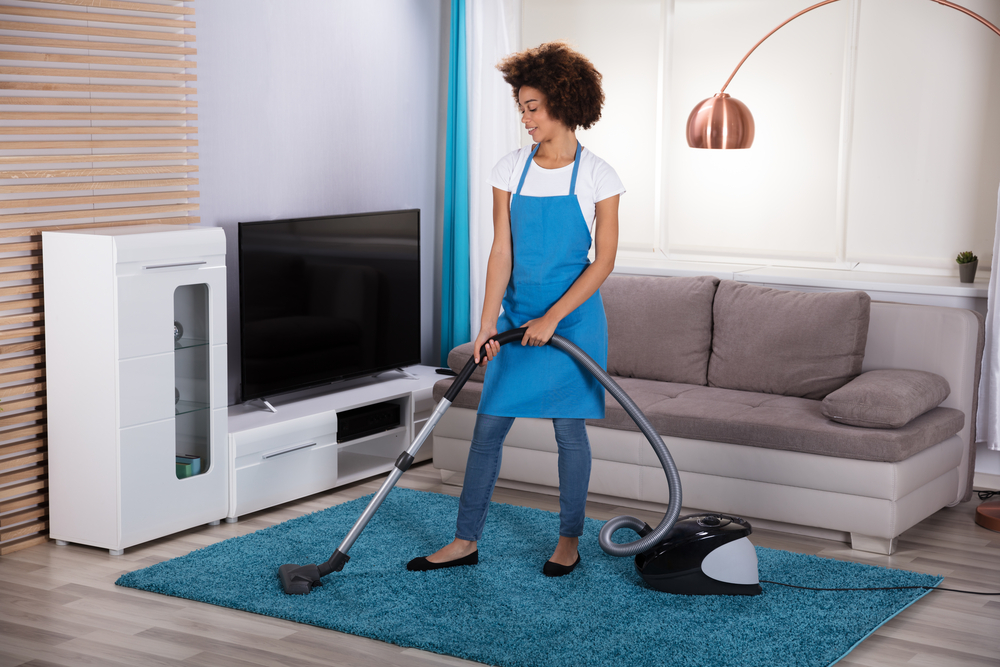
This image is property of i0.wp.com.
When Cleaning Before the Cleaner May Not Be Necessary
While cleaning before the cleaner is generally recommended, there are some situations where it may not be necessary. Consider the following circumstances where pre-cleaning may not be required.
Short notice or lack of time
If you have a last-minute cleaning request or lack the time to clean before the cleaner’s arrival, don’t worry. Professional cleaners are equipped to handle a variety of situations and can adapt their services accordingly. While it’s still beneficial to tidy up as much as possible, they can still provide a thorough cleaning service without prior preparation.
Emergency or urgent cleaning needs
In cases of emergency or urgent cleaning needs, such as a spill or accident that requires immediate attention, there may not be time to clean before the cleaner’s arrival. In these instances, it’s best to communicate the situation to the cleaner and allow them to address the issue promptly. They will prioritize the urgent task while ensuring the rest of your home is still given proper attention.
Physical limitations or health issues
If you have physical limitations or health issues that prevent you from cleaning before the cleaner’s arrival, it’s important to communicate this to the cleaner. They can make accommodations and provide the necessary assistance to ensure a clean and comfortable living environment. Professional cleaners understand and are trained to work with individuals who may require additional support.
Regular cleaning services with proven results
If you have established a regular cleaning schedule with a cleaner who consistently delivers satisfactory results, pre-cleaning may not be necessary. It’s likely that they are familiar with your home and have a good understanding of your cleaning preferences and needs. However, it’s still important to communicate any specific requests or changes to ensure a continued positive cleaning experience.
Trusting the cleaner’s expertise and professionalism
If you have complete trust in the cleaner’s expertise and professionalism, it may not be necessary to clean before their arrival. Professional cleaners undergo training and have the necessary skills and knowledge to provide a quality cleaning service. By trusting their abilities, you can alleviate the need for pre-cleaning and focus on other tasks or activities.
Tips for Choosing a Reliable Cleaner
Choosing a reliable cleaner is essential to ensuring a successful and satisfactory cleaning experience. Here are some tips to help you choose the right cleaner for your needs.
Seek recommendations and referrals
Start your search for a reliable cleaner by seeking recommendations and referrals from friends, family, or neighbors. Their personal experiences and feedback can point you in the right direction and give you confidence in your choice.
Check reviews and ratings
Read online reviews and check ratings for different cleaning services or individual cleaners. This can provide valuable insights into their level of professionalism, quality of service, and customer satisfaction. Pay attention to both positive and negative reviews to get a balanced perspective.
Verify licenses and insurance
Before hiring a cleaner, verify that they hold the necessary licenses and insurance required in your area. This ensures that they are operating legally and have coverage in case of any accidents or damage that may occur during the cleaning process.
Interview potential cleaners
Take the time to interview potential cleaners to get a sense of their experience, qualifications, and approach to cleaning. Ask about their cleaning methods, products used, and any additional services they provide. This allows you to gauge their suitability for your specific needs.
Discuss cleaning methods and products
During the interview or initial consultation, discuss the cleaner’s cleaning methods and the products they use. If you have specific preferences or requirements, ensure that they align with the cleaner’s approach. This helps avoid any potential conflicts or dissatisfaction with the cleaning service.
Address availability and scheduling
Consider the cleaner’s availability and scheduling options. Ensure that their availability aligns with your needs and that they can accommodate any specific time requirements you may have. This helps ensure a reliable and convenient cleaning service.
Clarify pricing and payment terms
Discuss and clarify pricing and payment terms upfront with the cleaner. Understand their fee structure, whether it’s based on an hourly rate or a flat fee. Also, discuss payment methods and the frequency of payments to avoid any misunderstandings or issues.
Request a trial period
If you are unsure about a cleaner’s suitability, consider requesting a trial period before committing to regular cleaning services. This allows you to assess their skills, professionalism, and compatibility with your needs. Use this trial period to provide feedback and decide if they are the right fit for your long-term cleaning requirements.
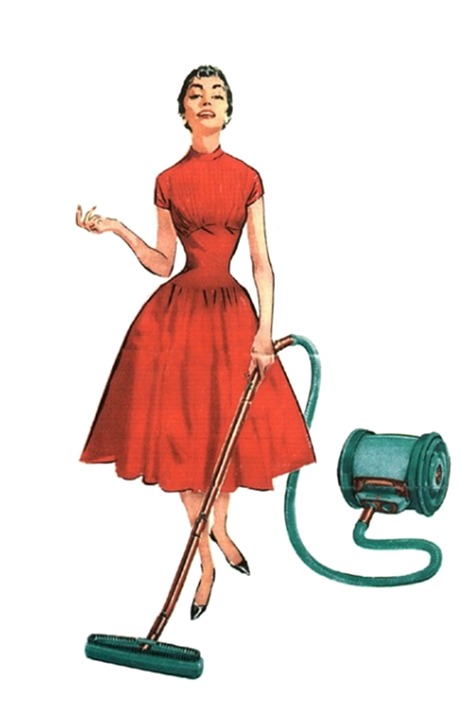
This image is property of images.squarespace-cdn.com.
Conclusion
Cleaning before the cleaner may seem counterintuitive, but it offers several benefits that contribute to a cleaner and more enjoyable living environment. By maintaining cleanliness standards, saving time and money, avoiding potential judgment or embarrassment, ensuring thorough cleaning, and preventing damage to personal items, you can make the most of your cleaning service.
Remember to focus on key areas such as general cleaning, clutter removal, surface cleaning, floor preparation, and specific areas like kitchen and dining areas, bathroom and toilet, bedrooms, and living spaces. Also, don’t forget to prepare personal items and valuables, as well as highly frequented areas. Be sure to communicate any special requests or instructions to the cleaner for a more personalized service.
During the cleaning process, follow tips such as creating a cleaning checklist, organizing and decluttering, pre-sorting laundry, securing personal items, and removing fragile or valuable objects from cleaning areas. These tips will help maximize efficiency, enhance the quality and results of the cleaning, and reduce the risk of accidents or damage.
Effective communication is crucial for a successful cleaning experience. Establish clear expectations and boundaries, communicate preferences and standards, provide constructive feedback, and address concerns promptly. Maintain open and respectful communication to foster a positive and professional relationship with your cleaner.
Cleaning before the cleaner may not always be necessary, such as in cases of short notice, emergencies, physical limitations, established regular cleaning services, or when you trust the cleaner’s expertise and professionalism. However, in most cases, pre-cleaning can help enhance the cleaning service and ensure a healthier and more enjoyable living environment.
When choosing a reliable cleaner, seek recommendations and referrals, check reviews and ratings, verify licenses and insurance, interview potential cleaners, discuss cleaning methods and products, address availability and scheduling, clarify pricing and payment terms, and consider requesting a trial period to make an informed decision.
Finding the right balance between cleaning before the cleaner and relying on their expertise is essential. Prioritize cleanliness and personal preferences, establish clear communication, consider the benefits and drawbacks, and make informed decisions based on your individual circumstances. With a thoughtful approach, you can create a clean and comfortable living environment that suits your needs and preferences.
